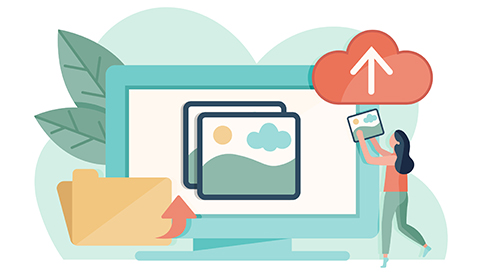Innovative Ideas for Mobile Apps to Drive Business Growth
Creating an app reflects our identity and a response to the gaps we perceive in the world. It involves introspection, identifying our passions, and recognizing unmet needs. However, generating an app idea for the first time can be intimidating, given the countless possibilities. The skill of generating great ideas for mobile apps is not exclusive to a select few; instead, it is a process that allows anyone to explore methods and find solutions to problems systematically. Whether you are an experienced creator or a beginner, we offer recommendations to inspire and support your quest to create your next remarkable app.
We suggest beginning by exploring your resources and studying your competitors. Additionally, conducting a comprehensive analysis of your industry is crucial. Lastly, we encourage you to expand your vision by exploring unrelated sectors. These steps will aid you in generating creative ideas for mobile apps. By the end of this article, we hope you will have a clearer understanding of the app idea, empowering you to continuously challenge yourself and others to strive for more significant innovation.
Why Mobile Apps Are Important for Your Business?
Due to the widespread use of smartphones and tablets, mobile apps have become integral to modern businesses. They offer numerous benefits and advantages, making them crucial for companies of all sizes and industries. Here are several reasons why mobile apps are important for your business.

Increased Customer Engagement
Mobile apps provide a direct and personalized channel for customers to engage with businesses. By offering features like push notifications, in-app messaging, and personalized recommendations, businesses can communicate directly with their customers and keep them engaged. This constant interaction builds brand loyalty and enhances the overall customer experience.
Enhanced Accessibility
Mobile apps allow businesses to be accessible to their customers anytime and anywhere. Users can easily access the app on their mobile devices, eliminating the need to visit a physical store or use a web browser. This convenience leads to increased customer engagement and sales opportunities.
Improved Brand Visibility
Having a mobile app allows your brand to be visible on customers’ mobile screens. Even when users are not actively using the app, they are reminded of your brand’s existence every time they scroll through their device’s app list. This constant presence reinforces brand recognition and helps to stay top of mind.
Competitive Advantage
In today’s digital landscape, having a mobile app can give your business a competitive edge. If your competitors do not have an app, you can leverage this opportunity to differentiate yourself and attract customers who prefer mobile interactions. Even if your competitors have apps, providing a better and more user-friendly experience can help you gain a competitive advantage.
Direct Marketing Channel
Mobile apps offer direct marketing channels where businesses can promote their products. Through push notifications, businesses can send targeted messages, special offers, promotions, and new product announcements directly to app users. This form of direct marketing is highly effective, as it reaches customers instantly and has a higher chance of being noticed compared to other marketing channels.
Data Collection and Analysis
Mobile apps provide valuable data about user behavior, preferences, and demographics. By analyzing this data, businesses can gain insights into customer trends, buying patterns, and preferences, allowing them to make informed business decisions. This data-driven approach lets companies personalize their offerings, improve customer satisfaction, and optimize their marketing strategies while ensuring compliance with user consent for apps.
Increased Sales and Revenue
Mobile apps can directly contribute to increased sales and revenue. With features like in-app purchases, mobile commerce, and seamless checkout processes, businesses can provide a convenient and streamlined buying experience. Additionally, mobile apps can serve as a platform for loyalty programs, exclusive discounts, and personalized recommendations, encouraging repeat purchases and higher customer lifetime value.
Customer Service and Support
Mobile apps can serve as a platform for efficient customer service and support. Businesses can integrate features like live chat, help desks, FAQs, and knowledge bases within their apps to address customer queries and provide assistance. This proactive approach to customer support enhances satisfaction levels and fosters long-term customer loyalty.
Types of Mobile Apps for Businesses
There are several types of mobile apps that businesses can develop and utilize based on their specific needs and goals. Each type of app serves a different purpose and caters to different aspects of the business. Here are some common types of mobile apps for businesses.

E-commerce Apps
E-commerce apps are designed for businesses that sell products or mobile app development services. These apps enable customers to browse catalogs, make purchases, track orders, and manage their accounts. They often include features such as secure payment gateways, personalized recommendations, wishlist creation, and order tracking, providing a seamless shopping experience for customers.
Social Media Apps
Social media apps allow businesses to connect and engage with their customers on popular social platforms. These apps typically include features for creating and sharing content, interacting with followers, running marketing campaigns, and analyzing social media metrics. They are effective for brand building, customer engagement, and driving traffic to the business’s website or online store.
On-Demand Service Apps
On-demand service apps are commonly used by businesses that provide services or facilitate service-based transactions. Examples include ride-sharing apps, food delivery apps, mobile app development services, and more. These apps connect service providers with customers, allowing users to request and schedule services, track service providers’ location, make payments, and provide ratings and reviews.
Productivity and Collaboration Apps
Productivity and collaboration apps are designed to enhance teamwork, streamline workflows, and improve overall productivity within an organization. These apps often include features such as file sharing, task management, team messaging, document collaboration, calendar integration, and project tracking. They are particularly useful for remote teams or businesses with employees working across different locations.
Customer Relationship Management (CRM) Apps
CRM apps manage and track customer interactions, sales leads, and customer data. They provide a centralized platform for businesses to store and access customer information, track sales activities, manage customer support tickets, and analyze customer behavior. Mobile CRM, a subset of CRM, extends these capabilities to mobile devices, allowing businesses to efficiently manage customer relationships on the go.
Mobile Banking and Finance Apps
Mobile banking and finance apps enable users to perform financial transactions, manage accounts, and access banking services through their mobile devices. These apps provide features such as account balance inquiry, fund transfers, bill payments, transaction history, ATM/branch locators, and mobile wallet integration. They offer convenience and accessibility for customers and are widely used by banks and financial institutions.
Education and E-learning Apps
Education and e-learning apps are used by educational institutions, online learning platforms, or businesses offering training and educational content. These apps provide access to course materials, video lectures, quizzes, interactive learning modules, progress tracking, and communication with instructors. They facilitate remote learning, self-paced learning, and personalized educational experiences.
Must Read: How To Turn Your Mobile App Idea Into Reality Like Stellar App?
10 Innovative Ideas For Mobile Apps That Can Help Your Business Grow Faster

Customized Virtual Stylist App
Create an app that provides personalized styling recommendations to users based on their preferences, body type, and fashion trends. Users can upload their wardrobes, receive outfit suggestions, and even purchase recommended items directly through the app. This is one of those ideas for mobile apps that can be particularly beneficial for fashion retailers or online clothing stores.
Sustainability Tracker App
Develop an app that allows users to track and monitor their environmental footprint. The app can provide insights and tips on sustainable practices, such as reducing energy consumption, recycling, or purchasing eco-friendly products. Businesses promoting sustainability and environmentally conscious practices can leverage this app to engage with their customers and showcase their environmental commitment.
Local Discovery and Experiences App
Build an app using an AI app maker that helps users discover unique local experiences, hidden gems, and events in their area. The app can curate recommendations based on user preferences, location, and interests. Businesses can partner with the app to promote their products, mobile app development services, or events, increasing their visibility and attracting new customers.
Virtual Personal Assistant App
Create a virtual personal assistant app that provides users with personalized assistance for scheduling appointments, managing to-do lists, making reservations, or ordering products and mobile app development services. This app can be particularly useful for busy professionals or individuals seeking convenience and time-saving solutions.
Interactive Customer Support App
Develop an app that offers interactive and real-time customer support. Users can initiate support requests, live chat with customer service representatives, or access self-help resources. This is one of the ideas for mobile apps that can help businesses provide exceptional customer service and resolve issues efficiently, leading to increased customer satisfaction and loyalty.
Language Learning and Translation App
Build an app that provides language learning courses and translation services. Users can learn new languages, practice conversation skills, or use the app as a text, image, or voice translation tool. This app can cater to individuals interested in language learning, frequent travelers, or businesses targeting international markets.
Virtual Interior Design App
Create an app that allows users to design and visualize their living spaces virtually. Users can upload room photos, experiment with different furniture arrangements, apply various color schemes, and purchase recommended items directly through the app. This app idea can benefit interior design businesses or furniture retailers.
Personal Finance Management App
Develop an app that helps users manage their personal finances effectively. The app can provide budgeting tools, expense tracking, bill reminders, savings goals, and insights on spending patterns. Businesses in the finance or banking industry can use this app to strengthen customer relationships and promote financial literacy.
Virtual Fitness and Wellness App
Create an app that offers virtual fitness classes, personalized workout routines, meditation sessions, or wellness challenges. Users can access on-demand content, track their progress, and interact with fitness instructors or wellness experts. This is one of the best ideas for mobile apps which caters to individuals seeking flexible fitness options and businesses in the health and wellness industry.
Mobile App Development Trends 2023
There are several mobile app development trends and developments in the mobile app industry that are likely to shape its future. Here are some potential mobile app design trends to watch out for.

5G Technology
The rollout of 5G networks will significantly impact mobile apps. With faster speeds, lower latency, and greater network capacity, 5G will enable more advanced and immersive app experiences, such as high-definition video streaming, augmented reality (AR), virtual reality (VR), and real-time multiplayer gaming.
Augmented Reality (AR) and Virtual Reality (VR)
AR and VR technologies are expected to continue gaining traction in the mobile app space. As these technologies become more accessible and developers explore new use cases, we can expect to see a wide range of AR and VR applications, including gaming, e-commerce, remote collaboration, virtual tourism, and more.
Internet of Things (IoT) Integration
The integration of mobile apps with IoT app development service is set to increase. Mobile apps will serve as a central hub for controlling and managing connected devices in smart homes, smart cities, healthcare, transportation, and other IoT-driven domains.
Artificial Intelligence (AI) and Machine Learning (ML)
Artificial intelligence in mobile applications will play a significant role in mobile app development. App developers will leverage these technologies to deliver personalised user experiences, predictive analytics, natural language processing, chatbots, recommendation systems, and more.
Voice-Enabled Apps and Assistants
Voice assistants and voice-enabled apps will become more prevalent. As natural language processing and voice recognition technologies improve, users will rely more on voice commands to interact with apps, perform tasks, and access information hands-free.
Progressive Web Apps (PWAs)
PWAs are web-based applications that offer native app-like experiences. They provide offline capabilities, push notifications, and access to device features, eliminating the need for users to download and install traditional mobile apps. PWA is expected to gain popularity as it bridges the gap between web and app experiences.
Cross-Platform Development
With the growing number of platforms and devices, cross-platform app development frameworks and tools will gain popularity. These frameworks allow developers to build apps that work across multiple operating systems, reducing development time and costs.
Hyper-Personalization and Contextual Experiences
Apps will increasingly leverage user data, location information, preferences, and contextual data to deliver highly personalized experiences. From customized recommendations to context-aware notifications, apps will strive to provide tailored and relevant content to individual users. Partnering with expert mobile app development services ensures these innovative ideas are executed flawlessly, increasing customer satisfaction and business growth.
Conclusion
Generating prolific ideas for mobile apps for your business needs a thoughtful and systematic approach. Following a few key steps can increase your chances of developing innovative and successful ideas for mobile apps.
Throughout this process, keeping the user experience at the forefront is important. Put yourself in the shoes of your target audience and consider their needs, preferences, and behaviors. A user-centric approach will help you develop unique ideas for mobile apps that resonate with your intended users.
By following these steps and staying committed to innovation, you can come up with prolific ideas for a mobile app that have the potential to drive growth, engage customers, and differentiate your business in the competitive mobile app market.




Leave a Reply